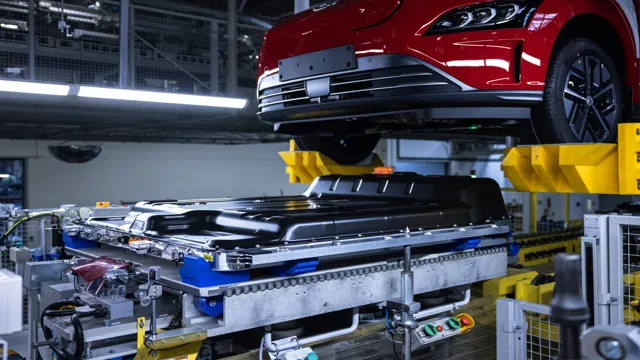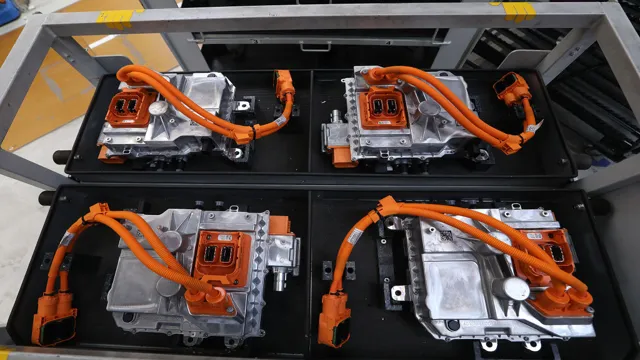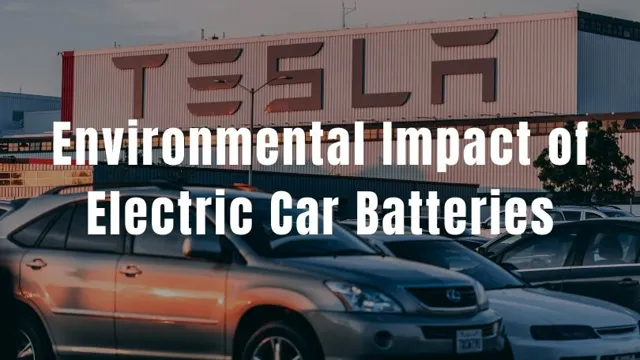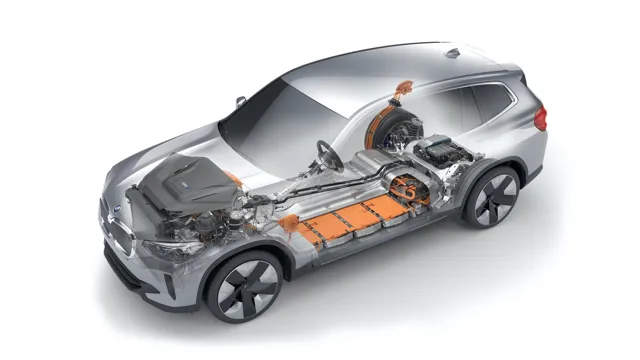Exploring the Myth of Batteries Burning in Electric Cars: Separating Fact from Fiction
The widespread adoption of electric cars as a viable alternative to traditional combustion engines has brought about several concerns, with one of the most prominent being the safety of batteries. As electric cars rely heavily on batteries as their sole source of power, the question on many people’s minds is whether these batteries pose a fire hazard. Lithium-ion batteries, the type of batteries used in most electric cars, have been known to catch fire under certain circumstances.
However, the likelihood of this happening is relatively low, and there are many measures in place to prevent such incidents from occurring. One of the main reasons why lithium-ion batteries can catch fire is due to their inherent chemistry, which means that they are sensitive to extreme temperatures, damage, and overcharging. While these factors can increase the risk of a fire breaking out, most modern electric cars have built-in safety systems that monitor battery conditions to avoid such scenarios.
Furthermore, manufacturers conduct rigorous testing to ensure that their batteries meet strict safety standards, and there are also recycling initiatives in place to ensure that used batteries are disposed of responsibly. While the fear of fire hazard is understandable, it is crucial to remember that every mode of transportation carries some form of risk. The benefits of electric cars in terms of the environment and efficiency far outweigh these risks, and with continued advancements in technology, the safety of electric cars will only continue to improve.
In conclusion, while it may seem concerning that batteries in electric cars could pose a fire hazard, it is important to keep in mind that the likelihood of such incidents occurring is relatively low. With various safety measures in place, advancements in technology, and responsible recycling initiatives, electric cars continue to be a sustainable and safe mode of transportation.
Electric Car Batteries are Burning
Batteries burning in electric cars have recently gained attention and concern among the public. While it is true that electric cars are more environmentally friendly compared to their gasoline counterparts, it’s important to address the safety issue of their batteries. Since the batteries in electric cars hold a large amount of energy, any kind of accident or malfunction can result in a devastating fire.
In recent years, there have been several cases of electric car batteries catching fire or exploding during an accident, and it raises concerns for the safety of drivers and passengers. Manufacturers have been working to improve the safety of electric car batteries, but it’s still essential for owners to take precautions, such as storing their cars properly and following maintenance guidelines to minimize the risk of battery-related accidents. Nevertheless, as electric cars become more common, it’s important for manufacturers to focus on making them as safe as possible, especially regarding their batteries.
Examples of Battery Fires in Electric Cars
Electric Car Batteries are Burning Electric car batteries have been known to catch fire in rare cases, causing significant damage and posing a potential risk to passengers and those around the vehicle. Some of the most notable incidents include a Tesla Model S catching fire after hitting debris on the highway, a Chevrolet Bolt EV catching fire in a driveway while charging, and a Karma Revero catching fire during a test drive. While electric cars have made significant strides in safety and reliability, these incidents serve as a reminder that battery technology is not foolproof and that precautions must be taken to prevent fires.
As the electric car industry continues to grow rapidly, it is crucial that manufacturers and regulators prioritize safety and work to minimize the risk of battery fires.

What Causes Electric Car Battery Fires?
As electric cars become more prevalent on the roads, so too are news reports of battery fires. But what is causing these fires? In many cases, it comes down to a simple issue: overheating. Electric car batteries are prone to overheating due to a number of factors, including poor design, faulty wiring, and malfunctioning cooling systems.
When a battery overheats, it can quickly catch fire, leading to dangerous and potentially deadly situations. However, it’s important to note that electric car battery fires remain relatively rare – far less common than traditional car fires. Despite this, electric car manufacturers are constantly working to improve battery safety, developing new cooling systems, and incorporating fire suppression technology into their vehicles.
As electric car technology continues to evolve, we can expect to see even greater strides in battery safety in the years to come.
The Risks Associated with Battery Fires
One of the biggest concerns regarding electric cars is the risk of batteries burning. While the likelihood of a battery fire occurring is still relatively low, it’s important to acknowledge that they can happen and take precautions to prevent them from occurring. There have been instances of batteries catching fire during crashes or due to manufacturing defects.
Lithium-ion batteries used in electric cars are highly combustible and can potentially burn for hours. It’s essential that electric car manufacturers continue to work on improved safety measures to mitigate these risks and ensure the safety of drivers and passengers. Overall, while battery fires remain a concern, they should not deter individuals from considering buying an electric car, as the benefits of reduced emissions and energy efficiency far outweigh the risks.
Environmental Impact of Battery Fires
The environmental impact of battery fires can be disastrous. The risks that are associated with these fires are significant and should not be ignored. Lithium-ion batteries, which are commonly used in electronic devices, are highly susceptible to overheating and catching fire if they are not handled properly.
Additionally, battery fires can produce toxic gases and chemicals that can harm the environment and human health. For example, lithium-ion batteries contain highly toxic metals such as cobalt, nickel, and lithium, which can be released into the atmosphere during a fire. These chemicals can contaminate soil and water sources, leading to serious health problems.
It is crucial to take the necessary precautions to prevent battery fires from occurring, and to properly dispose of batteries to reduce their environmental impact. This means avoiding overcharging, storing batteries in a cool and dry place, and recycling old batteries at designated collection points. By taking these simple steps, we can help reduce the risk of battery fires and protect our environment from their harmful effects.
Safety Concerns for Electric Car Drivers and Passengers
Electric car drivers and passengers may have concerns about safety, particularly when it comes to the risk of battery fires. While these incidents are relatively rare, they have happened in the past and can be dangerous if not handled properly. The risk of a battery fire is usually higher in an electric car than a traditional gasoline-powered vehicle due to the high energy density of lithium-ion batteries.
This means that the batteries contain a large amount of energy in a relatively small space, creating the potential for danger in the event of a short circuit or other malfunction. However, it’s important to note that electric cars are designed with safety in mind, and many models have built-in safety features like automatic disconnect systems and thermal management systems to mitigate the risks. Additionally, the risk of a battery fire can be reduced by following recommended maintenance procedures and avoiding exposing the battery to extreme temperatures.
While battery fires are a potential risk for electric car drivers and passengers, it’s worth keeping in mind that they are still considered safe and reliable vehicles overall.
Financial Losses Due to Electric Car Battery Fires
Electric Car Battery Fires Electric cars have undoubtedly gained popularity in recent times due to their eco-friendliness and lower running costs, but the risk of battery fires has been a major concern. Battery fires, although rare, can be catastrophic as they can lead to significant financial losses. The high voltage batteries powering electric vehicles contain a large amount of energy, which can cause the battery to catch fire in the event of a collision or a failure in the cooling system.
The costs associated with these fires can be immense, including damage to the vehicle’s components, infrastructure, and injuries to occupants and other road users involved. Moreover, in the worst-case scenario, the vehicle can be completely destroyed, leading to a total loss for the owner. To avoid such occurrences, manufacturers must ensure the safety of these vehicles, and users must exercise caution while handling and charging them.
It is important to note that despite the risks, electric cars are still considered safer than traditional gasoline-powered vehicles due to the lower risk of explosions or fuel leakage.
Reducing the Risk of Electric Car Battery Fires
Batteries burning in electric cars have been a concern for many, especially after a few high-profile incidents. However, manufacturers and researchers are continuously working on mitigating this risk. One of the major ways to reduce the risk of batteries burning is by improving their thermal management systems.
Electric car batteries produce a significant amount of heat, and if the temperature inside the battery pack rises too high, it can lead to a thermal runaway reaction. Implementing an effective cooling system can help disperse the heat and prevent the battery from overheating. Additionally, increasing the durability and resilience of the battery casing can also minimize the risk of damage and leakage.
Manufacturers are also exploring the use of fire-retardant materials for battery packs, which can help prevent or delay the spread of flames. As the technology continues to evolve, electric car batteries are becoming safer and more efficient, bringing us closer to a sustainable future.
Improving Battery Design and Safety Features
As electric cars become increasingly popular, concerns about battery safety have also risen. There have been a few incidents of electric car battery fires, and manufacturers are working hard to improve the design and safety features of these batteries. One key strategy is to make the batteries more resistant to damage in the event of a crash.
For example, some manufacturers are using materials that are less likely to catch fire or leak toxic chemicals in the event of an accident. In addition, many electric cars are equipped with sophisticated cooling systems that can help prevent the battery from overheating. Overall, reducing the risk of electric car battery fires will require ongoing innovation and collaboration between car manufacturers, battery makers, and safety experts.
But as we continue to make progress, we can enjoy the many benefits of these efficient, eco-friendly vehicles with peace of mind.
Proper Maintenance and Handling of Electric Car Batteries
As electric cars continue to grow in popularity, it’s essential to understand the proper maintenance and handling of their batteries to reduce the risk of fires. One of the most important steps is to avoid overcharging the battery. Once the battery is fully charged, unplug the charging cord.
If left plugged in, excess heat can build up, increasing the risk of a fire. Also, make sure to store the battery at the correct temperature. Extreme heat or cold temperatures can damage the battery and increase the risk of a fire.
Another critical factor is regular maintenance of the battery. Check for any signs of damage or wear and tear regularly. If you notice any issues, take the car to a certified technician for repair.
Remember, taking care of your electric car’s battery is crucial for the safety of both you and your vehicle.
Conclusion: The Future of Electric Cars and Battery Safety
In the end, it turns out that electric cars might not be as eco-friendly as we thought. With the potential for batteries to catch fire and release harmful chemicals into the atmosphere, we need to prioritize finding safer and more sustainable alternatives. After all, the last thing we want is for our electric cars to become nothing more than oversized lighters on wheels.
“
FAQs
Can electric car batteries catch fire?
Yes, electric car batteries can catch fire under certain conditions such as damage to the battery pack or overheating.
How can battery fires in electric cars be prevented?
Battery fires in electric cars can be prevented by regular maintenance and monitoring of the battery pack, as well as implementing safety features such as thermal management systems and battery diagnostics.
What should you do if an electric car battery catches fire?
In case of a battery fire in an electric car, it is recommended to evacuate the vehicle immediately, move at least 300 feet away and call emergency services. Do not attempt to put out the fire yourself.
Are electric car batteries more prone to catching fire than gasoline-powered cars?
While both electric and gasoline-powered cars can catch fire, studies have shown that electric car batteries are less likely to ignite in a crash due to safety measures such as battery enclosures and electronics that shut off power in the event of a collision.






